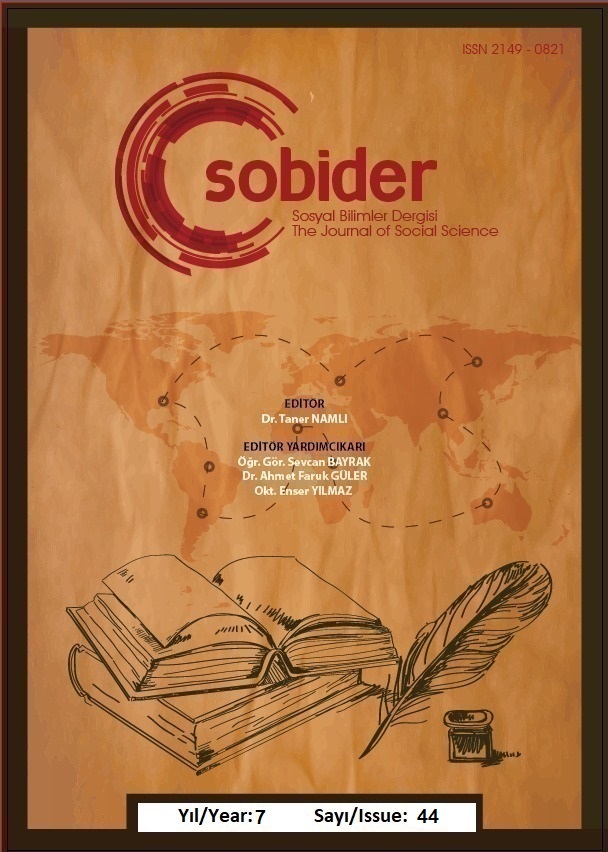Author :
Abstract
Çalışma, sınırları ve anlamı itibariyle muğlak olan ve net bir tanımlaması yapılamayan ‘insan doğası’ kavramını tarihsel sosyoloji geleneğinin içinde yer alan Karl Polanyi ve E. P. Thompson’nın sırasıyla ‘Büyük Dönüşüm’ ve ‘İngiliz İşçi Sınıfının Oluşumu’ eserlerindeki fikirleri üzerinden tartışacaktır. Bu nedenle çalışma, ‘insan doğası’ ile ilgili literatürdeki farklı görüşleri ve düşünürleri ayrıntılı olarak konu edinmemektedir. Buradan hareketle, tek tek insanların psişik özelliklerinden ziyade toplumsalın hem üreticisi hem de ürünü olarak ‘insan doğası’na odaklanacak olan bu çalışma, piyasa ve toplumun karşıt ikilikler olarak konumlandırılışını anlamlı görmemekte ve bunların tarihsel olarak birbirlerini oluşturduğunu varsaymaktadır. Bunun anlaşılması için Karl Polanyi’nin ve E. P. Thompson’nın belirtilen eserleri üzerinden verilecek örnekler ise Polanyi’nin ‘çifte hareket kuramı’ üzerinden sınanacaktır.
Keywords
Abstract
This paper will discuss the concept of human nature which is ambigious and can not be clearly defined in terms of its boundary and meaning, through the ideas of Karl Polanyi and and E. P. Thompson, two thinkers in the area of historical sociology, through their works ‘Great Transformation’ and ‘The Making of the English Working Class’ respectively. Therefore, the study does not discuss opinions and thinkers on the topic in detail, it is restricted to the discussion of ideas displayed in Polanyi’s and Thompson’s aforementioned works. In this regard, the study considers human nature as both a producer and product of social relations rather than phychical feature of individuals. From this point of view, the paper does not see the positioning of the market and society as opposing dualities meaningful and assumes that they have historically formed each other. For that purpose, examples driven from the stated works of Polanyi and Thompson are analyzed through Polanyi’s ‘double movement theory’.
Keywords
- Agamben, Giorgion. (2013). Kutsal İnsan: Egemen İktidar ve Çıplak Hayat. (Çev. İsmail Türkmen). İstanbul: Ayrıntı Yayınları.
- Alford, Fred. (2010). Narrative, Nature, and the Natural Law: From Aquinas to International Human Rights. U.S. : Palgrave Macmillan.
- Archibald, Peter W. (1989). Marx and the Missing Link: “Human Nature”. UK: Palgrave Macmillan.
- Block, Fred & Somers, R. Margaret. (1999). ‘Ekonomist Yanılgının Ötesi: Karl Polanyi’nin Holistik Toplum Bilimi’. (ed.) Theda Skocpol. Tarihsel Sosyoloji: Bloch’tan Wallerstein’e Görüşler ve Yöntemler. (Çev. Ahmet Fethi). İstanbul: Tarih Vakfı Yurt Yayınları.
- Buğra, Ayşe. (2011). ‘Önsöz’. içinde Büyük Dönüşüm: Çağımızın Siyasal ve Ekonomik Kökenleri. (Çev. Ayşe Buğra). İstanbul: İletişim Yayınları. p. 11-32.
- Chomsky, Noam. (1999). Powers and Prospects: Reflections on Human Nature and the Social Order. London: Pluto Press.
- Chomsky, Noam & Foucault, Michel. (2006). The Chomsky-Foucault Debate: On Human Nature. New York: The New Press.
- Clark, Mary E. (2002). In Search of Human Nature. London: Routledge.
- Geras, Norman. (2002). Marks ve İnsan Doğası. (Çev. İsmet Akça & M. Görkem Doğan). İstanbul: Birikim Yayınları.
- Hanna, Robert. (2006). Kant, Science, and Human Nature. U.S. : Oxford University Press.
- konusudur. Bununla beraber Polanyi’nin (2011: 237) ‘taşıyıcısı işçi sınıfı olan sanayi dini’ olarak
- Hayden, F. Gregory. (2015). ‘Strengthening Karl Polanyi’s Concepts of Reciprocity, Double Movement, and Freedom with the Assistance of Abductive Logic’. Journal of Economic Issues. 49: 2. p. 575-582.
- Hobbes, Thomas. (2007). Leviathan. (Çev. Semih Lim). İstanbul: Yapı Kredi Yayınları.
- Hobsbawn, Eric. (2006). ‘Giriş: Gelenekleri İcat Etmek’. içinde Geleneğin İcadı. (eds.) Eric Hobsbawn & Terence Ranger. (Çev. Mehmet Murat Şahin). İstanbul: Agora Kitaplığı.
- Jaggar, M. Alison. (1983) Feminist Politics and Human Nature. Sussex: The Harvester Press.
- Kail, P.J.E. (2012). ‘The Sceptical Beast in the Beastly Sceptic’. in Human Nature. (eds.) Constantine Sandis & M.J. Cain. UK: Cambridge University Press.
- Locke, John. (2004). Hükümet Üzerine İkinci İnceleme. (Çev. Fahri Bakırcı). Ankara: Babil
- Mann, Michael. (2003). The Sources of Social Power: The Rise of Classes and Nation-States, 1760-1914. Cambridge: Cambridge University Press.
- Mauss, Marcel. (2002). The Gift: The Form and Reason for Exchange in Archaic Societies. London & New York: Routledge.
- May, Hope. (2010). Aristotle’s Ethics: Moral Development and Human Nature. London & New York: Continuum.
- Moore, Barrington. (2016). Diktatörlüğün ve Demokrasinin Toplumsal Kökenleri: Çağdaş Dünyanın Yaratılmasında Soylunun ve Köylünün Rolü. (Çev. Alaeddin Şenel & Şirin Tekeli). Ankara: İmge Kitabevi.
- Öngen, Tülin. (2002). ‘Marx ve Sınıf’. Praksis. Sayı: 8. p. 9-28.
- Pasnau, Robert. (2001). Thomas Aquinas on Human Nature: A Philosophical Study of Summa Theologiae, 1a 75-89. UK: Cambridge University Press.
- Polanyi, Karl. (1957). ‘The Economy as Instituted Process’. in Trade and Market in the Early Empires: Economies in History and Theory. (eds.) Karl Polanyi, Conrad M. Arensberg & Harry W. Pearson. New York: Free Press. p. 239-270.
- ______ (2011). Büyük Dönüşüm: Çağımızın Siyasal ve Ekonomik Kökenleri. (Çev. Ayşe Buğra). İstanbul: İletişim Yayınları.
- Pompa, Leon Pompa. (1990). Human Nature and Historical Knowledge: Hume, Hegel and Vico. UK: Cambridge University Press.
- Ritzer, George & Stepnisky, Jeffrey. (2018). Classical Sociological Theory. Los Angeles: SAGE.
- Rogan, Tim. (2017). Moral Economists: R. H. Tawney, Karl Polanyi, E. P. Thompson, and the Critique of Capitalism. Princeton & Oxford: Princeton University Press.
- Rousseau, J. J. (2003). İnsanlar Arasındaki Eşitsizliği Kökeni. (Çev. Ertuğ Ergün). Ankara: Yeryüzü Yayınevi. ______(2012). Toplum Sözleşmesi. (Çev. Vedat Günyol). İstanbul: Türkiye İş Bankası Kültür
- Sahlins, Marshall. (2010). Taş Devri Ekonomisi. (Çev. Taylan Doğan & Şirin Özgün). İstanbul: BGST Yayınları.
- Schmitt, Carl. (2018). Siyasal Kavramı. (Çev. Ece Göztepe). İstanbul: Metis Yayınları.
- Stevenson, Leslie & Haberman, L. David. (1989). Ten Theories of Human Nature. New York: Oxford University Press.
- Stevenson, Leslie (vd.). (2018). Thirteen Theories of Human Nature. U.S.: Oxford University Press.
- Şeriati, Ali. (1997). İnsanın Dört Zindanı. (Çev. Hüseyin Hatemi). İstanbul: İşaret Yayınları.
- Tabak, Mehmet. (2012). Dialectics of Human Nature in Marx’s Philosophy. U.S.: Palgrave
- Thompson, Edward P. (1993). Custom in Common. London: Penguin Books.
- ______ (2012). İngiliz İşçi Sınıfının Oluşumu. (Çev. Uygur Kocabaşoğlu). İstanbul: Birikim
- Wallerstein, Immanuel. (2009). Tarihsel Kapitalizm. (Çev. Necmiye Alpay). İstanbul: Metis
- Weber, Max. (1999). Protestan Ahlakı ve Kapitalizmin Ruhu. (Çev. Zeynep Gürata). Ankara: Ayraç Yayınevi.
- Wilkin, Peter. (1997). Noam Chomsky: On Power, Knowledge and Human Nature. UK: Palgrave Macmillan.





